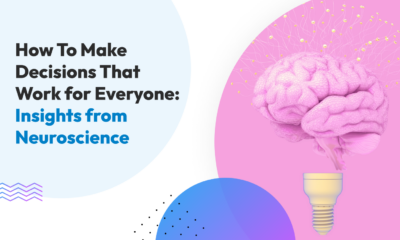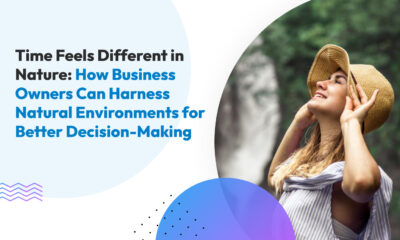Science Says
Harnessing the Power of Mind Wandering for Entrepreneurs According to Psychology
Mind wandering is a fascinating phenomenon where our minds drift away from the present and explore unrelated thoughts. It influences our work, and being aware of its effects is crucial. Mind wandering can be both a blessing and a curse: it can lead to mistakes and difficulties in focusing, but it can also spark creativity and aid in future planning. Our brain’s ability to regulate wandering thoughts is important for effective thinking. By understanding and managing mind wandering, we can harness its potential benefits while mitigating its drawbacks, enhancing productivity, and fostering innovation. In the following sections, we reviewed the study, “The Science of Mind Wandering: Empirically Navigating the Stream of Consciousness” by Jonathan Smallwood and Jonathan W. Schooler and breaking down the key takeaways including specific examples for entrepreneurs and business owners.
4 Implications of Mind Wandering on Ongoing Performance for Entrepreneurs:
Mind Wandering and Performance:
Mind wandering can harm your performance in tasks that require concentration, like reading and listening to lectures. However, the impact of mind wandering on performance depends on the situation and task demands.
Being aware of how mind wandering affects your performance can help you manage it effectively.
Suppose you’re preparing a pitch for a potential client and find your mind drifting to unrelated topics, like a vacation or a family event. This could lead to a less effective presentation or even forgetting key points. However, if you’re doing a routine task, such as sorting emails, a bit of mind wandering might not significantly impact your performance and could even lead to a creative business idea.
Context Regulation:
It may be better to limit mind wandering to less demanding situations rather than trying to completely avoid it.
When tasks require high attention, focus on suppressing mind wandering. During tasks that are less demanding, allowing your mind to wander can actually help with future thinking.
This means, it might be okay to let your mind wander during a routine task, like tidying up your desk or updating a piece of software, where your input is not crucial, potentially leading to innovative ideas. However, during a negotiation with a potential supplier or client, you would need to suppress mind wandering to stay focused on the discussion and make the best decisions.
Impact on Intellectual Functioning:
Mind wandering can be problematic for tasks that require intellectual abilities. People who tend to mind wander during tests that assess memory and intelligence often have lower performance on general aptitude tests.
This shows the importance of avoiding mind wandering during challenging tasks for overall intellectual ability.
For example, when you’re working on a complex business strategy, you would need to avoid mind wandering to ensure you are fully utilizing your intellectual abilities and creating the most effective plan. If you allow your mind to wander, you might miss important details or make errors in your strategy.
Delayed Gratification:
The ability to delay gratification is connected to regulating mind wandering. Those who can resist immediate rewards for greater future benefits tend to experience more self-generated thoughts when demands are low.
This suggests the ability to adjust mind wandering based on external conditions.
As a business owner, you might resist the temptation to take a smaller, immediate profit, choosing instead to wait for a potentially larger profit in the future. This ability to delay gratification could be linked to your ability to control mind wandering, focusing your thoughts on the long-term benefits rather than the immediate reward.
Understanding how mind wandering affects performance, considering the context of tasks, and recognizing the link between delayed gratification and mind wandering regulation can help entrepreneurs improve their focus, manage distractions, and enhance their overall task performance.

3 Ways to minimize the downsides of mind wandering:
Mindfulness Training:
Practice being fully present and focused on the current moment. Join a mindfulness-training program to reduce mind wandering and improve performance. Even a short 10-minute exercise of focusing on your breath can help reduce distractions and errors.
You could use a mindfulness app or online program to practice focusing on the present moment. This could help you reduce mind wandering during important tasks, leading to improved performance and fewer errors.
Meta-Awareness:
Regularly check in on your thoughts and notice when your mind starts to wander. Pay attention to whether you are drifting away from the task at hand. Mindfulness training can help you develop the habit of noticing when your mind wanders.
You might set reminders on your phone or computer to check in on your thoughts throughout the day, noticing when your mind starts to wander from the task at hand. This could help you bring your focus back to your work when necessary, improving your productivity.
Task Engagement:
Engage in activities that keep you actively involved and interested in what you’re doing. If you are teaching or coaching others, include quizzes or tests during tasks to prevent student/trainee minds from wandering and enhance learning. Find ways to make the task more interesting or meaningful to maintain focus and minimize distractions.
For instance, if you’re training a new team member, you could include quizzes during the training to keep them engaged and prevent their minds from wandering. You could also use gamification strategies, such as setting up competitions or rewards, to make tasks more interesting and keep your team focused – or even to keep yourself focused.
By practicing mindfulness, being aware of your thoughts, and staying engaged in tasks, entrepreneurs can reduce the negative impact of mind wandering. This leads to better concentration, improved performance, and enhanced retention of information.

5 Benefits of Letting Your Mind Wander
Future Planning:
Allow your mind to wander and think about the future, as it can help you plan and achieve your goals.
Consider both the potential obstacles and the benefits of overcoming them.
For example, you might allow your mind to wander to future scenarios, such as potential market changes or new product ideas. This could help you plan for the future and set goals for your business.
Boosting Creativity:
Embrace daydreaming as it can spark new and creative ideas. Engage in tasks that don’t require your full attention to encourage divergent thinking and generate innovative solutions.
For example, you might embrace daydreaming during a routine task, such as a daily commute or a regular workout. This could lead to new and creative ideas for your business, such as a unique marketing strategy or a new product feature.
Finding Meaning:
Use daydreaming to reflect on past experiences and imagine future events, giving your experiences a sense of purpose and personal significance. Integrate your experiences into a meaningful narrative to enhance your well-being and fulfillment.
You could integrate this reflection and imagination of the future into a narrative that gives your work a sense of purpose or help you determine the North Star of your business. This can enhance motivation and fulfillment, driving you to work harder and achieve your business goals.
Refreshing Mental Breaks:
View daydreaming as a valuable break from mundane or repetitive tasks. Let your mind wander during boring activities to improve your mood and provide a mental recharge.
Similar to Dreaming:
Notice the similarities between daydreaming and dreaming during sleep. Both involve spontaneous thoughts and a break from external distractions. Daydreaming and dreaming can boost creativity and help you prepare for potential challenges. By embracing moments of daydreaming, entrepreneurs can enjoy benefits such as effective future planning, enhanced creativity, finding personal meaning, taking refreshing breaks, and leveraging the parallels between daydreaming and dreaming for potential insights and preparedness.
Wrap Up
Mind wandering is a fact of our cognitive experience, whether we want it or not, that can both hinder and benefit entrepreneurs. Understanding its impact on performance, context regulation, intellectual functioning, and delayed gratification is crucial. To minimize its downsides, try mindfulness training, cultivate meta-awareness, and use the strategies outlined here to stay engaged in tasks. Embrace daydreaming for future planning and creativity, find meaning in your experiences, and take refreshing mental breaks. By practicing mindfulness and leveraging the benefits of mind wandering, entrepreneurs can improve focus, performance, and overall success. Embrace your wandering mind to fuel innovation and productivity.












